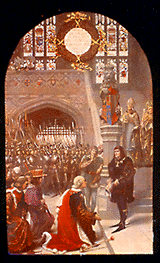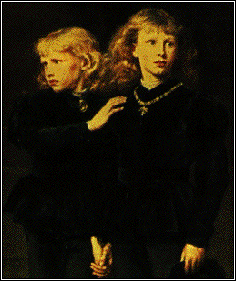| | 
RICHARD III OFFERED THE CROWN BY PARLIAMENT | The story of Richard III, usurper and murderer of the rightful heirs to the throne, is commonly known. But just how much of it is truth, and how much of it is propaganda stirred up by Henry VII and his descendants in an effort to justify the legitimacy of their claim to the crown? For propaganda was what Henry VII desperately needed. His claim to the throne was almost negligible--his father and his grandfather were both illegitimate, and his descent from the bastard Beaufort children of John of Gaunt was through a woman. All this, in addition to the age-old rival Yorkist claim of their descent from an elder son of Edward III meant that quite simply, Henry had about as much right to the throne of England as the average London fishmonger. How, then, to maintain his claim to the throne in the wake of all these damning facts? Henry certainly intended to keep the throne at all costs...the numerous bloody executions of other potential heirs was evidence of this. Henry's tack then, was to portray his victory over Richard at Bosworth as divinely ordained proof of his right to Kingship. To do this correctly, he was forced to portray Richard as a sort of soulless demon who had to be exorcised for the sake of the nation. Thus, his historians spun tales of Richard--that he had been born with a full set of teeth and hair down to his shoulders, hideously deformed and supremely evil at heart--that would be passed down to future generations. The final nail in the coffin of Richard's reputation was when Shakespeare, writing for Henry's granddaughter Elizabeth I, created his cycles of plays about Richard, in which he murders no less than ten people! So how much truth was there in these accusations? Students of history have argued these points for centuries, and it is difficult to reconcile these arguments. As Anthony Cheetham points out about Richard, "Fuelled with moral outrage, the hostile critic sees in every act of justice a cynical attempt to cultivate popularity; in every grant a bribe; in every gesture of conciliation the stirrings of an uneasy conscience." Clearly, Richard's actions can be interpreted a variety of ways. By now, however, the following facts have been almost universally agreed upon: | Richard III: Facts and Myths | Richard was not disfigured, nor a hunchback. One of his shoulders may have been higher than the other, but neither portraits nor contemporary records show him to be crippled in any way. The discrepancy in the shoulders seems to have been the sole basis for all later tales of his withered arm. Pictures of Richard were often altered to reflect his current standing--the "Broken Sword" portrait, for example, was changed in post-Tudor years to make Richard appear less sinister. Almost undoubtedly, Richard was not responsible for the death of the ousted Henry VI or of Henry's son Edward. No record exists that indicates that Henry VI died by Richard's sword. Although Richard was present at his execution in 1471, it is somewhat ludicrous to believe that the brother to the King would sully his hands at the chopping block. The theory that Richard murdered Henry without consulting Edward IV is similarly unlikely--Henry's fate was already sealed, at any rate. Similarly, Prince Edward was slain at Tewkesbury by men commanded by George, Duke of Clarence, and not by Richard. Again, his fate as an heir to the rival house was sealed, no matter who wielded the axe. Richard certainly had no role in the execution of his brother George. All records indicate that George died simply because of his foolish and reckless behaviour in threatening King Edward, and that it was purely Edward's whim (with perhaps some manipulation by his Woodville connections) which brought down the Duke of Clarence. There is even evidence to support the claim that Richard was quite vocal in his defense of Clarence, despite previous bad blood. Richard's execution of the men leading Edward V's procession towards London was highly suspicious, although perhaps not entirely unjustified. The men leading King Edward's train to London were Earl Rivers and Richard Grey, the brother and son to Queen Elizabeth, and Thomas Vaughan, a noted supporter. The Woodvilles had long attempted to promote their faction, and the entourage sent with the new King was less of an escort than a full-scale army. Very clearly, the Queen intended to be the dominating force behind the new government. Richard, as appointed Lord Protector, had an obligation to prevent this. However, Richard's actions, as would later be the case time and again, were hampered by his own utter lack of subtlety. The arrest of the Woodvilles was done only on the vaguest of charges, and he even made a botched attempt to frame them by producing supposed arms caches that they were said to have hidden to produce a coup. His execution of these three men in York a short time later did little to clear his reputation. Still, it might well be argued that Richard's vendetta against the Woodvilles and their kin was simply that, a vendetta, and not a step in a masterful plan to control the throne. Richard did have ample reason to despise this family, who had pushed for the execution of one brother and intensely manipulated the other. The execution of Lord Hastings was politically motivated. It is difficult to justify Richard's actions here: Lord Hastings, who was by all accounts an honourable man, had committed only one crime: refusal to support Richard's claim. He was trapped in the middle of a council meeting and accused with vague charges of treason and, laughably, sorcery, done upon Richard in conjunction with Hastings' mistress Jane Shore. Furthermore, in blatant disregard of legality, his execution was conducted scant minutes after the accusation. Showcased by silly over-acting on Richard's part, the incident was a suspicious affair, illegal and immoral. Richard may or may not have believed his nephews bastards. Richard had young King Edward and his brother declared illegitimate, thus creating himself the rightful heir to the throne. He supplied sufficient evidence to back this claim, including a priest who was said to have secretly married Edward IV to another woman years ago, but of course such evidence could easily have been bought. It is difficult to gauge Richard's motivations in this case. He may have believed the story, he may have been attempting to seize power, or possibly he may have concocted the tale to protect England from the turmoil that would certainly have erupted by placing a child-King on the throne. Richard's intentions towards Elizabeth of York are difficult to determine, but he did not murder his wife in order to marry his niece. While there is a certain amount of evidence indicating that Richard and Elizabeth of York had an unusually close relationship, and while Richard had every motive for wishing Elizabeth to be married in order to prevent her husband from using her descent as a tool for rebellion, there is absolutely no evidence that Richard had his wife Anne murdered--she seems to have died of illness, possibly cancer, and Richard seems to have been properly grieved over her loss. Whether Richard intended to marry Elizabeth afterwards is impossible to say, although it is worth pointing out that the Catholic Church tended to frown about uncles marrying their nieces. | 
| And then there is the matter of the murdered Princes... Zealous believers of Richard's vileness claim that surely Richard himself must have killed the boys, while passionate defenders of Richard's honour claim that surely Henry VII must have been responsible for their deaths. But what truly happened to the Princes? All that is known is that they disappeared into the tower in 1483. There are no contemporary records indicating that anyone killed the Princes, except for documents indicating the popular opinion of the time, (that Richard had had them murdered) but this is still scarcely reliable. In 1502, Sir James Tyrrel, (a man who had been favored by both Richard and Henry) captured and interrogated by Henry VII on unrelated charges of treason, curiously confessed to murdering the boys on Richard's orders. Was Sir James attempting to absolve himself of years of guilt? Or was the confession fabricated by Henry VII for his own purposes? The first person to openly accuse Richard in print was Sir Thomas More, writing decades after the fact, gathering information from Tyrrel's confession (now lost), and various sources he had questioned and rumors he had heard. Still, the fact remains that an accusation is not a proof. So was the crime Richard's or Henry's? While Richard would certainly seem to have a strong case against him, those arguing in his favor have some extremely valid points to make. And of course, for every argument in Richard's favour, his opponents have a counter-argument printed in RED. Go to the next page & read on! 
|
 Free Forum Hosting
Free Forum Hosting